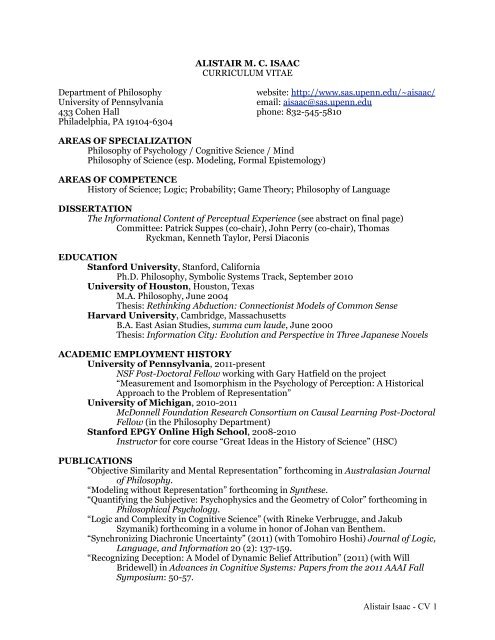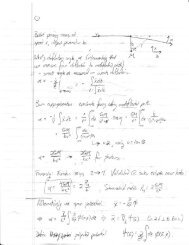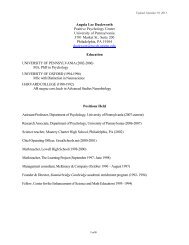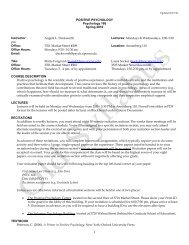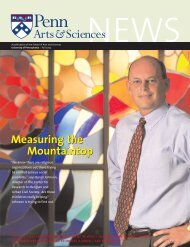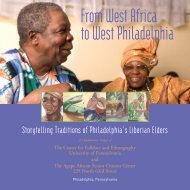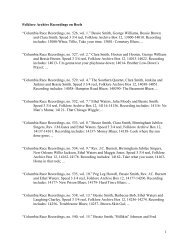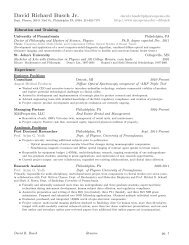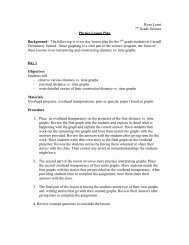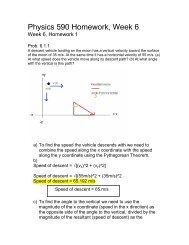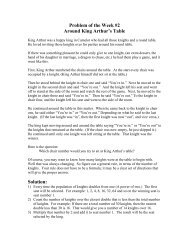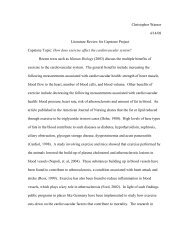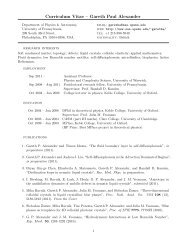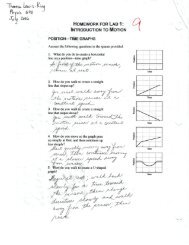ALISTAIR M. C. ISAAC CURRICULUM VITAE Department of ...
ALISTAIR M. C. ISAAC CURRICULUM VITAE Department of ...
ALISTAIR M. C. ISAAC CURRICULUM VITAE Department of ...
You also want an ePaper? Increase the reach of your titles
YUMPU automatically turns print PDFs into web optimized ePapers that Google loves.
<strong>ALISTAIR</strong> M. C. <strong>ISAAC</strong><br />
<strong>CURRICULUM</strong> <strong>VITAE</strong><br />
<strong>Department</strong> <strong>of</strong> Philosophy website: http://www.sas.upenn.edu/~aisaac/<br />
University <strong>of</strong> Pennsylvania email: aisaac@sas.upenn.edu<br />
433 Cohen Hall phone: 832-545-5810<br />
Philadelphia, PA 19104-6304<br />
AREAS OF SPECIALIZATION<br />
Philosophy <strong>of</strong> Psychology / Cognitive Science / Mind<br />
Philosophy <strong>of</strong> Science (esp. Modeling, Formal Epistemology)<br />
AREAS OF COMPETENCE<br />
History <strong>of</strong> Science; Logic; Probability; Game Theory; Philosophy <strong>of</strong> Language<br />
DISSERTATION<br />
The Informational Content <strong>of</strong> Perceptual Experience (see abstract on final page)<br />
Committee: Patrick Suppes (co-chair), John Perry (co-chair), Thomas<br />
Ryckman, Kenneth Taylor, Persi Diaconis<br />
EDUCATION<br />
Stanford University, Stanford, California<br />
Ph.D. Philosophy, Symbolic Systems Track, September 2010<br />
University <strong>of</strong> Houston, Houston, Texas<br />
M.A. Philosophy, June 2004<br />
Thesis: Rethinking Abduction: Connectionist Models <strong>of</strong> Common Sense<br />
Harvard University, Cambridge, Massachusetts<br />
B.A. East Asian Studies, summa cum laude, June 2000<br />
Thesis: Information City: Evolution and Perspective in Three Japanese Novels<br />
ACADEMIC EMPLOYMENT HISTORY<br />
University <strong>of</strong> Pennsylvania, 2011-present<br />
NSF Post-Doctoral Fellow working with Gary Hatfield on the project<br />
“Measurement and Isomorphism in the Psychology <strong>of</strong> Perception: A Historical<br />
Approach to the Problem <strong>of</strong> Representation”<br />
University <strong>of</strong> Michigan, 2010-2011<br />
McDonnell Foundation Research Consortium on Causal Learning Post-Doctoral<br />
Fellow (in the Philosophy <strong>Department</strong>)<br />
Stanford EPGY Online High School, 2008-2010<br />
Instructor for core course “Great Ideas in the History <strong>of</strong> Science” (HSC)<br />
PUBLICATIONS<br />
“Objective Similarity and Mental Representation” forthcoming in Australasian Journal<br />
<strong>of</strong> Philosophy.<br />
“Modeling without Representation” forthcoming in Synthese.<br />
“Quantifying the Subjective: Psychophysics and the Geometry <strong>of</strong> Color” forthcoming in<br />
Philosophical Psychology.<br />
“Logic and Complexity in Cognitive Science” (with Rineke Verbrugge, and Jakub<br />
Szymanik) forthcoming in a volume in honor <strong>of</strong> Johan van Benthem.<br />
“Synchronizing Diachronic Uncertainty” (2011) (with Tomohiro Hoshi) Journal <strong>of</strong> Logic,<br />
Language, and Information 20 (2): 137-159.<br />
“Recognizing Deception: A Model <strong>of</strong> Dynamic Belief Attribution” (2011) (with Will<br />
Bridewell) in Advances in Cognitive Systems: Papers from the 2011 AAAI Fall<br />
Symposium: 50-57.<br />
Alistair Isaac - CV 1
“Taking Mistakes Seriously: Equivalence Notions for Game Scenarios with Off<br />
Equilibrium Play” (2011) (with Tomohiro Hoshi) in Logic, Rationality, and<br />
Interaction (Springer Lecture Notes in Artificial Intelligence 6953): 111-124.<br />
“Logic in Cognitive Science: Bridging the Gap between Symbolic and Connectionist<br />
Paradigms” (2011) (with Jakub Szymanik) Journal <strong>of</strong> the Indian Council <strong>of</strong><br />
Philosophical Research 27 (2): 255-281.<br />
“The Strategic Equivalence <strong>of</strong> Games with Unawareness” (2010) (with Tomohiro Hoshi)<br />
in Logic and Interactive Rationality, ed. D. Grossi, L. Kurzen, and F. R.<br />
Velázquez-Quesada: 203-225.<br />
“Prospects for Naturalizing Color” (2009) Philosophy <strong>of</strong> Science 76 (5): 902-914.<br />
UNDER SUBMISSION / REVISION<br />
“Natural Meaning is not Factive” under revision for resubmission to Canadian Journal<br />
<strong>of</strong> Philosophy.<br />
“Structural Realism for Secondary Qualities” under submission to Erkenntnis.<br />
“Physicalist vs. Ecological Accounts <strong>of</strong> Perceptual Content: Lessons from Timbre” under<br />
submission to the Southern Society for Philosophy and Psychology.<br />
“Mindreading Deception in Dialog” (with Will Bridewell) under submission to Cognitive<br />
Systems Research.<br />
CONFERENCE PRESENTATIONS / INVITED TALKS<br />
“Newtonian Answers to Baconian Questions: Pro<strong>of</strong> by Experiment in Newton’s Optical Research”<br />
• HOPOS (International Society for the History and Philosophy <strong>of</strong> Science), June 21-21, 2012.<br />
• The 27th Boulder Conference on History and Philosophy <strong>of</strong> Science, Sept. 23-25, 2011.<br />
“Modeling without Representation”<br />
• American Philosophical Association, Pacific Division Annual Meeting, April 4-7, 2012.<br />
“Taking Mistakes Seriously: Equivalence Notions for Game Scenarios with Off Equilibrium Play”<br />
• The Third International Workshop on Logic, Rationality and Interaction, Oct. 10-13, 2011.<br />
“Outlining a Computationally Plausible Approach to Mental State Ascription”<br />
• IACAP (International Association for Computing and Philosophy), July 4-6, 2011.<br />
“Diachronic Dutch Book Arguments for Forgetful Agents”<br />
• Munich Center for Mathematical Philosophy, June 29, 2011.<br />
• Epistemology Meets Logic, Informally (at Stanford, CSLI), June 1, 2008.<br />
“Prospects for Naturalizing Color, or ‘What’s blue and yellow and green all over?’”<br />
• Philosophy <strong>of</strong> Science Association 21st Biennial Meeting, November 7, 2008.<br />
“Diachronic Uncertainty and Equivalence Notions for Models <strong>of</strong> Extensive Form Games,”<br />
• ESSLLI (European Summer School in Logic, Language, and Information) in the Workshop<br />
“Logic and Intelligent Interaction: Charting the Technical Contours,” Aug. 12, 2008.<br />
“God, Failing to Emerge, Nevertheless Perseveres,”<br />
• Stanford Mini-Conference on Mind, Emergence, and Deity, October 28, 2005<br />
TEACHING EXPERIENCE<br />
Primary Instructor<br />
Philosophy <strong>of</strong> Mind, University <strong>of</strong> Pennsylvania (Fall, 2012)<br />
Great Ideas in the History <strong>of</strong> Science, Stanford EPGY - Online High School (2008 - 2010)<br />
Teaching Assistant<br />
Stanford University<br />
Introduction to Cognitive Science<br />
Introduction to Philosophy<br />
Introduction to Logic<br />
First Order Logic<br />
Introduction to Political Philosophy<br />
University <strong>of</strong> Houston<br />
Introduction to Logic<br />
Introduction to Ethics<br />
Alistair Isaac - CV 2
PROFESSIONAL ACTIVITIES AND POSITIONS<br />
Editor Erkenntnis special issue on “Game Theory and Communication” (forthcoming)<br />
Cognition and Language Workshop coordinator, 2008-2010<br />
In this capacity I also organized these conferences:<br />
Game Theory and Communication, May 28-9, 2010<br />
Language and Power, November 21, 2009<br />
Language, Communication, and Rational Agency, May 30-1, 2009<br />
Spatial Relations: An Interdisciplinary Perspective, March 7, 2009<br />
Symposium on Linguistic Relativity, Oct. 25, 2008<br />
Admissions Committee member, Philosophy <strong>Department</strong>, 2007-2008<br />
CSLI Cog Sci Lunch Coordinator, 2005-2008<br />
Graduate Student Representative, Philosophy <strong>Department</strong>, 2006-2007<br />
Hume Society (graduate student organization) Co-President, 2005-2006<br />
In this capacity I also organized and coordinated the<br />
Berkeley / Stanford / Davis Graduate Student Conference, April 8, 2006<br />
PROFESSIONAL ORGANIZATIONS<br />
History <strong>of</strong> Philosophy <strong>of</strong> Science, since 2012<br />
American Philosophical Association, since 2008<br />
American Association for the Advancement <strong>of</strong> Science, since 2008<br />
Philosophy <strong>of</strong> Science Association, since 2007<br />
Association for Symbolic Logic, since 2004<br />
HONORS, AWARDS, AND FELLOWSHIPS<br />
Institute for Humane Studies Fellowship, 2009-2010<br />
Certificate in Cognitive Science, University <strong>of</strong> Houston, 2004<br />
Cullen Supplemental Fellowship, University <strong>of</strong> Houston 2002-2004<br />
Noma-Reischauer Undergraduate Essay Prize, 2000 (for senior thesis)<br />
John Harvard Scholarships, 1995-1998<br />
Detur Prize, Harvard University, 1996<br />
GRADUATE COURSES AND SEMINARS (* audit)<br />
History and Philosophy <strong>of</strong> Science<br />
Philosophy <strong>of</strong> Psychology (University <strong>of</strong> Pennsylvania, Gary Hatfield)*<br />
Philosophy and Visual Perception (University <strong>of</strong> Pennsylvania, Gary Hatfield)*<br />
Newtonian Revolutions (Stanford, George Smith)*<br />
Philosophy <strong>of</strong> Physics (Stanford, Thomas Ryckman)*<br />
Core Seminar: Philosophy <strong>of</strong> Science (Stanford, Michael Friedman and Thomas Ryckman)<br />
Quine (Stanford, Dagfinn Follesdal)<br />
History <strong>of</strong> 17th Century Philosophy (UH, Gregory Brown)<br />
Philosophy <strong>of</strong> Science (UH, William Austin)<br />
Philosophy <strong>of</strong> Physics (Harvard, Tim Maudlin)<br />
Cognitive Science / Artificial Intelligence<br />
Evolution and Communication (Stanford, Bryan Skyrms)<br />
Aping: Imitation, Control, and Development <strong>of</strong> Human Mind (Stanford, Michael Ramscar)<br />
Minds and Machines (Stanford, Solomon Feferman)*<br />
Individual Study: Nonmonotonic Logic and Neural Networks (Stanford, Hannes Leitgeb)<br />
Mind and Brain (Stanford, Patrick Suppes and Dagfinn Follesdal)<br />
Reasoning and Learning in Cognitive Systems (Stanford, Patrick Langley)<br />
Knowledge Representation (Stanford, Johan van Benthem and Yoav Shoham)<br />
Logic, Language, and Information (Stanford, Johan van Benthem)<br />
Finite State Methods in Natural Language Processing (Stanford, Lauri Karttunen)<br />
Alistair Isaac - CV 3
Introduction to Formal Semantics (Stanford, David Beaver)<br />
English Grammar (Stanford, Ivan Sag)<br />
Introduction to Cognitive Science (UH, Anne Jaap Jacobson)<br />
Pro-seminar in Cognitive Science (UH, Anne Jaap Jacobson<br />
Russell, Turing, and Wittgenstein (UH, Justin Leiber)<br />
Neural Bases <strong>of</strong> Language (UH, Arturo Hernandez)<br />
Human Nature and Linguistics (UH, Justin Leiber)<br />
Logic and Formal Methods<br />
Recursion Theory (Stanford, Solomon Feferman)<br />
Group Study: Logic and History <strong>of</strong> Set Theory (Stanford, advisor Solomon Feferman)<br />
Set Theory (Stanford, Sergei Tupailo)<br />
Philosophy <strong>of</strong> Logic (Stanford, Solomon Feferman)<br />
Pro<strong>of</strong> Theory (Stanford, Solomon Feferman)<br />
Finite Model Theory (Stanford, Solomon Feferman)<br />
Advanced Modal Logic (Stanford, Johan van Benthem)*<br />
Great Ideas in Probability (Stanford, Persi Diaconis and Brian Skyrms)*<br />
Computability (UH, James Garson)<br />
Modal Logic (UH, James Garson)<br />
Miscellaneous<br />
Core Seminar: Philosophy <strong>of</strong> Language (Stanford, John Perry)<br />
Philosophy <strong>of</strong> Language (UH, Paul Saka)<br />
Nietzsche (Stanford, R. Lanier Anderson)<br />
Normativity (Stanford, Kenneth Taylor)*<br />
Seminar on Nozick’s Invariances (UH, Bredo Johnsen)<br />
Classics in the History <strong>of</strong> Ethics (UH, David Phillips)<br />
Buddhist Epistemology (Stanford, Wilhelm Essler)<br />
Morality, Reason, and Self-Interest (UH, David Phillips)<br />
Philosophy <strong>of</strong> Art (UH, Cynthia Freeland)<br />
REFERENCES<br />
Patrick Suppes John Perry<br />
Center for the Study <strong>of</strong> Language and Information <strong>Department</strong> <strong>of</strong> Philosophy<br />
Ventura Hall, Stanford University Stanford University, Bldg. 90<br />
Stanford, CA 94305-4115 Stanford, CA 94305-2155<br />
psuppes@stanford.edu john@csli.stanford.edu<br />
650-725-6030 650-328-3232<br />
Gary Hatfield Thomas Ryckman<br />
<strong>Department</strong> <strong>of</strong> Philosophy <strong>Department</strong> <strong>of</strong> Philosophy<br />
University <strong>of</strong> Pennsylvania Stanford University, Bldg. 90<br />
433 Cohen Hall Stanford, CA 94305-2155<br />
Philadelphia, PA 19104-6304 tryckman@stanford.edu<br />
hatfield@phil.upenn.edu 650-725-9665<br />
215-898-6346<br />
(teaching letter)<br />
Kenneth Taylor Tomohiro Hoshi<br />
<strong>Department</strong> <strong>of</strong> Philosophy OHS SPCS<br />
Stanford University, Bldg. 90 Stanford University<br />
Stanford, CA 94305-2155 220 Panama St.<br />
ktaylor@stanford.edu Stanford, CA 94305<br />
650-723-1840 thoshi@stanford.edu<br />
650-721-9348<br />
Alistair Isaac - CV 4
The Informational Content <strong>of</strong> Perceptual Experience<br />
(dissertation abstract)<br />
What does our perceptual experience tell us about the world? This dissertation develops a<br />
general framework for answering this question based on the insight that perceptual experiences<br />
measure the world. I mean this quite literally: the relationship between any particular domain <strong>of</strong><br />
perceptual experiences and the domain <strong>of</strong> properties in the world they are experiences <strong>of</strong> satisfies the<br />
formal requirements <strong>of</strong> the theory <strong>of</strong> measurement. Consequently, the content <strong>of</strong> a particular<br />
perceptual experience within this domain can be understood as the outcome <strong>of</strong> a measurement <strong>of</strong> some<br />
property in the world.<br />
Although this framework for analyzing perceptual content is applicable to any type <strong>of</strong><br />
perceptual experience, the dissertation focuses on the particular example <strong>of</strong> color experience. Color<br />
science defines possible color experiences in terms <strong>of</strong> a three dimensional structure: the color solid. I<br />
argue that the color solid constitutes a scale against which surface properties <strong>of</strong> objects can be<br />
measured. I next argue that color terms derive their semantics from the color solid, and not directly<br />
from any relationship to surface properties. This explains the use <strong>of</strong> color terms to describe both<br />
surface properties (“grass is green”) and apparent surface properties (“the forest floor is dappled grey<br />
and gold”) within a unified semantic framework.<br />
In order to achieve this goal, I develop a detailed theory <strong>of</strong> natural information. I provide a<br />
definition <strong>of</strong> informational content in terms <strong>of</strong> descriptive features <strong>of</strong> the world, without reference to<br />
intentionality or external semantic norms. In this sense, the definition is naturalistic. This<br />
naturalistic definition <strong>of</strong> informational content allows me to characterize precisely just what a<br />
perceptual experience tells one about the world in a non-circular way.<br />
I distinguish two distinct types <strong>of</strong> natural information. One is exemplified by natural signs,<br />
e.g. smoke as a sign <strong>of</strong> fire or clouds as a sign <strong>of</strong> rain. The informational relationship between a<br />
particular experience <strong>of</strong> color (say, <strong>of</strong> vermilion) and a particular state <strong>of</strong> the world (say, the presence<br />
<strong>of</strong> cinnabar) can be characterized in terms <strong>of</strong> natural signs: an experience <strong>of</strong> vermilion is a sign <strong>of</strong> the<br />
presence <strong>of</strong> cinnabar. However, one must be careful here; the complicated contextual effects which<br />
determine color experience ensure that an experience <strong>of</strong> vermilion will be a sign <strong>of</strong> many other states<br />
<strong>of</strong> the world besides those in which cinnabar is present. This motivates the idea that the total content<br />
<strong>of</strong> a natural sign is given by a vector <strong>of</strong> the log probabilities <strong>of</strong> each signified state conditional on the<br />
signifying state.<br />
The second type <strong>of</strong> natural information is natural measurement, which characterizes the<br />
informational relationship between two causally entangled spaces <strong>of</strong> possibilities. In an abstract sense,<br />
measurement involves a relationship between two such spaces, e.g. the space <strong>of</strong> possible heights <strong>of</strong><br />
mercury in a glass tube and the space <strong>of</strong> possible temperatures. In nature, the space <strong>of</strong> possible<br />
shadow orientations stands in the same formal relationship to the space <strong>of</strong> possible positions <strong>of</strong> the<br />
sun in the sky, and therefore constitutes a natural measurement. Likewise, the space <strong>of</strong> possible color<br />
experiences measures the space <strong>of</strong> possible spectral power distributions <strong>of</strong> light.<br />
A classic challenge for naturalistic theories <strong>of</strong> content is the problem <strong>of</strong> how to characterize<br />
representational error. My framework suggests a novel solution to this problem. How can bearers <strong>of</strong><br />
naturalistic content ever misrepresent the world if there is no normative standard available by which<br />
to evaluate their correctness? A popular response is teleosemantics, which derives the<br />
representational function <strong>of</strong> a mental state from its evolutionary history, and error from a failure to<br />
fulfill this function. Unfortunately, the attribution <strong>of</strong> function on the basis <strong>of</strong> evolutionary history is<br />
extremely contentious within evolutionary biology, motivating the need for an alternate solution.<br />
My own explanation <strong>of</strong> apparent misrepresentations by perceptual experience follows directly<br />
from the analysis <strong>of</strong> perception as measurement. Most cases <strong>of</strong> perceptual error are properly<br />
understood as instances <strong>of</strong> inaccuracy, i.e. the measured value does not agree with the “true” value in<br />
the world. But the source <strong>of</strong> these perceptual inaccuracies is almost always due to contextual effects. I<br />
argue that context calibrates a perceptual scale, and it is only when comparing values across<br />
differently calibrated scales (e.g. the apparent color <strong>of</strong> a dress in sunlight and under fluorescent light)<br />
that perceptual measurements appear to be in error. This analysis explains away apparent perceptual<br />
error in a precise way, thus meeting the demands <strong>of</strong> empirical adequacy without relying on suspect<br />
norms or teleological attributions.<br />
Alistair Isaac - CV 5


